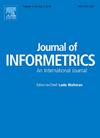理解科学合作过程中的知识增长:来自国家自然科学基金项目的证据
IF 3.5
2区 管理学
Q2 COMPUTER SCIENCE, INTERDISCIPLINARY APPLICATIONS
引用次数: 0
摘要
随着科学任务的日益复杂,科学合作变得越来越流行,尤其是由国家自然科学基金委员会(NSFC)等大型资助机构支持的科学项目。本研究重点对国家自然科学基金项目团队科学协作过程中的网络增量要素进行建模,以了解错综复杂的知识增长机制。研究定义了代表知识增量的四个要素:隔离(Isolation)、混合添加(Mixed Addition)、包容(Inclusion)和内部关联(Internal Correlation)。此外,还确定了四种知识增量模式和不同的合作流程。研究发现了以下主要结论:(1)国家自然科学基金项目团队在合作过程中优先考虑知识吸收和整合,主要通过混合添加法推进知识。(2) 与管理科学与工程(MSE)团队相比,管理科学与工程学科(MSE)团队倾向于通过混合添加法拓展知识,而经济科学(ES)团队则更倾向于通过包容法和内部关联法拓展知识。(3) 知识开拓模式会对生产率产生负面影响,而知识扩展和增强模式的出现则会显著提高生产率。总之,本研究从知识增长的角度探讨了团队协作过程,为优化团队管理、提高协作效率提供了有价值的启示。本文章由计算机程序翻译,如有差异,请以英文原文为准。
Understanding knowledge growth in scientific collaboration process: Evidence from NSFC projects
Scientific collaboration has become increasingly popular due to the growing complexity of scientific tasks, especially for scientific projects supported by large funding agencies such as The National Natural Science Foundation of China (NSFC). This study focuses on modeling the network incremental elements within the scientific collaboration process of NSFC project teams to understand the intricate knowledge growth mechanisms. Four elements representing incremental knowledge were defined: Isolation, Mixed Addition, Inclusion, and Internal Correlation. Additionally, four knowledge incremental patterns and different collaboration processes were identified. The study discovered the following key findings: (1) NSFC project teams prioritize knowledge absorption and integration during collaboration, predominantly advancing knowledge through Mixed Addition approaches. (2) Teams in Management Science and Engineering (MSE) discipline tend to expand through Mixed Addition approaches, while Economic Science (ES) teams prefer Inclusion and Internal Correlation approaches for team development compared to MSE teams. (3) The knowledge pioneering pattern negatively impacts productivity, while the emergence of knowledge expansion and enhancement patterns can lead to significant improvements. Overall, this study explores the team collaboration process from the knowledge growth perspective, which provides valuable insights for optimizing team management and improving collaboration efficiency.
求助全文
通过发布文献求助,成功后即可免费获取论文全文。
去求助
来源期刊

Journal of Informetrics
Social Sciences-Library and Information Sciences
CiteScore
6.40
自引率
16.20%
发文量
95
期刊介绍:
Journal of Informetrics (JOI) publishes rigorous high-quality research on quantitative aspects of information science. The main focus of the journal is on topics in bibliometrics, scientometrics, webometrics, patentometrics, altmetrics and research evaluation. Contributions studying informetric problems using methods from other quantitative fields, such as mathematics, statistics, computer science, economics and econometrics, and network science, are especially encouraged. JOI publishes both theoretical and empirical work. In general, case studies, for instance a bibliometric analysis focusing on a specific research field or a specific country, are not considered suitable for publication in JOI, unless they contain innovative methodological elements.
 求助内容:
求助内容: 应助结果提醒方式:
应助结果提醒方式:


